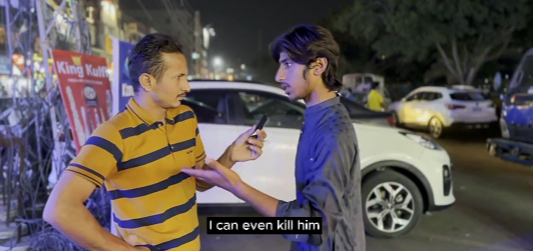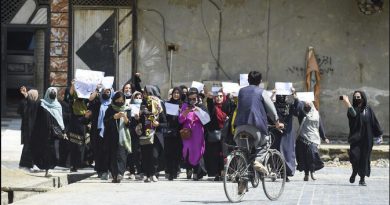Height of Radicalization: Pakistani Teen Vows to Kill Hindus for Not Converting to Islam
The interview sheds light on the presence of radicalization within Pakistani society, particularly among impressionable youth.
A ninth-grade Pakistani teenager, expressed a disturbing mindset towards Hindus, stating that he would either convert them to Islam or kill them, which reflects the depth of radicalization within the Pakistani society.
In a recent interview conducted by Pakistani influencer Qasim Munir, the Pakistani teenager, originally from Pakistan-occupied Kashmir, made alarming statements, when Munir questioned him about his views on different religious communities other than Muslims.
When asked about his feelings towards Hindus, the teenager responded with a chilling statement, saying, “I will surely do that to a Hindu. I can even kill him”. He further justified his extremist stance by labeling Hindus as non-believers, emphasizing his belief that they should be eliminated.
Munir probed further, inquiring about the motivation behind such extreme views. The teenager remained steadfast, asserting his readiness to carry out violent acts against Hindus based on his religious beliefs. When questioned about his grade level, the teenager revealed that he was in the ninth grade, highlighting the concerning fact that such radicalization can manifest at such a young age.
As the conversation continued, Munir sought clarification on the teenager’s willingness to kill Hindus. The teenager unflinchingly affirmed his intentions, emphasizing that he would invite Hindus to embrace Islam, and if they refused, he would kill them.
Munir asked, “So you find a Hindu, you will kill him?”
The teenager promptly responded, “Yes definitely. Ask me why? See, God will guide him. Humans cannot bless guidance. We’ll invite him to Islam. If he doesn’t accept, then we’ll”.
Munir then raised the topic of the India-Pakistan war while praying “May Allah forbid”—which means May God not make this war happen, and then inquired about the teenager’s stance. The teenager expressed a wish for war and questioned why Allah would forbid it. This statement reflects a dangerous level of hostility and a lack of understanding regarding the consequences and devastation war can bring.
The interview sheds light on the presence of radicalization within Pakistani society, particularly among impressionable youth. It highlights the urgent need for efforts to combat extremist ideologies and promote tolerance, understanding, and peaceful coexistence among different religious communities.
It is important to recognize that this teenager’s views do not represent the entirety of Pakistani society. However, the interview serves as a stark reminder of the challenges that exist in countering radicalization and promoting a climate of respect and acceptance.
Addressing radicalization requires a comprehensive approach involving education, community engagement, and the promotion of interfaith dialogue. By fostering an environment that encourages empathy, mutual understanding, and respect for all individuals, steps can be taken to counter extremist narratives and build a more harmonious society.
This interview serves as a wake-up call, emphasizing the importance of addressing radicalization at its roots to ensure a peaceful and inclusive future for all individuals, irrespective of their religious beliefs.



